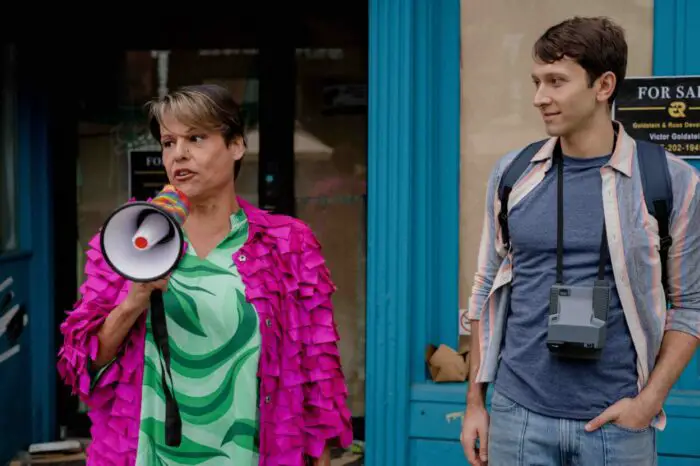“This is my mother’s. This is her legacy, and I’m finishing it for her.”
Some films are hard to watch in a good way. Reem Morsi’s Queen Tut is the perfect example of this principle, a film that makes itself difficult to watch at times but always in service of its goals. Queen Tut is a lot of things, from a commentary on gentrification’s effect on history to a coming-out story, and even yet another wonderful little queer comedy when it chooses. More than any of that, however, it’s a story about self-acceptance in the face of a world that shuns it.

New to Toronto, Nabil Gamil (Ryan Ali) finds himself rapidly caught between a rock and a hard place. With his father joining efforts to tear down an iconic queer bar right as Nabil begins to find a home there, Nabil takes on an almost immediate double life. Oscillating between the person that he’s expected to be and the person he actually is, Nabil faces a chorus line of impossible decisions.
Fortunately, Malibu (Alexandra Billings) is here to help guide him in all of the ways that his father can’t. When Nabil begins processing his mother’s death by giving life to her old dress designs, Malibu is there to help him not only learn how to do it, but how to wear them as well.

Surrounded by drag queens, kings, and a community that accepts him as he is, Nabil is made to struggle with his father’s redevelopment plan, his faith, and what it means to be himself. There may be plenty of movies about coming out, but none handle it quite like this.
There may be plenty of angles from which to approach Queen Tut, from Nabil’s inner conflict to that of people trying to save a local landmark, but every road leads to Rome in the end. Both stories are intertwined, with people trying to bury the uglier parts of their past to face an expected future.
There’s something so visceral in how Queen Tut chooses to tell that story. Watching a (presumably) cisgender heterosexual man police the language of a trans woman while doing nothing to address her actual problem may seem absurd to some, but it’s an all too real experience outside of the film. As Nabil tries going out in drag for the first time, it’s almost unbearable to watch, an embarrassing reminder of experiences every gender non-conforming person has had.

The above being said, Ryan “Taz De Ville” (Kiriana Stanton) has a reaction that made me laugh harder than I have in months, and it’s not even her best line read in the film. This cast could not be made stronger, with performances across the board landing their death drops. Dani Jazzar’s solemn performance as Nabil’s father, Iskander, feels as if it was plucked out of a memory, a father figure who could easily have been real.
Not enough praise could be said for costume designer Leeland Mitchell and hair/makeup designer AJ Lauren. Drag looks are already difficult enough, but with scenes that intentionally depict bad makeup, it’s easy to overlook how difficult it can be to put together. Mitchell and Lauren’s work captures so much of drag culture and style in a way that cannot possibly be overstated. With so much of the film focused on the creation of various dresses, at no point does a costume seem out of place, no matter the design. Maybe this says more about drag performers than anything else, but there’s an undeniable accuracy in these depictions.

The parts of Queen Tut that become difficult to watch come from more than simply secondhand embarrassment. There’s an undeniable sense of loss carried through the entire film, with characters openly mourning their family and friends. For many, it’s still difficult to talk about, friends lost to everything from AIDS to violence, and so many other preventable things. At a certain point, it seems that every queer person has a list of people close to them who didn’t make it.
Rather than bury that point, leaving it out to spoil in subtext alone, Queen Tut wears it on its sleeve. It’s easy for other films to ignore, to give a passing mention, and move on, but personal loss is something that can feel almost inseparable from queerness. Seeing that put on a screen again when many others refuse to show it is nothing if not cathartic.
Queen Tut avoids ending with a cop-out. It would have been easy for the film to end with Nabil’s father accepting him after seeing him in drag, seeing his passion. It would have been easy to leave it ambiguous, something that viewers could wonder about. Instead, the route the film takes is something real. For all of its heel-throwing fun, Queen Tut keeps itself and its characters grounded, even if it means a lack of solid catharsis.
At the end of the day, Queen Tut is a beautiful piece of queer cinema. There might be room for some to nitpick, but it never tries to sanitize itself, it never begs for a happier ending. With more and more queer films coming across as being made for people outside of the community, Queen Tut is a well-timed breath of fresh air.




